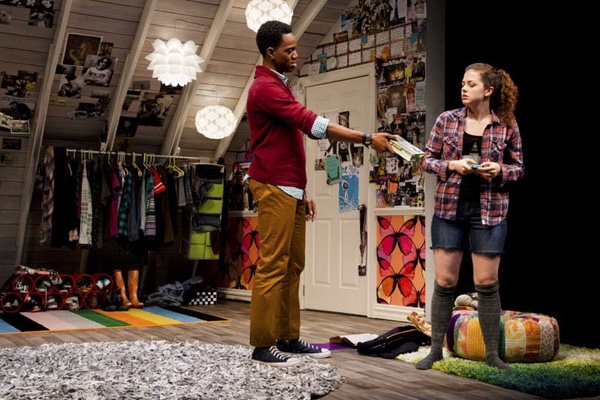Can Walt Whitman’s Nineteenth Century Poetry Save Today’s Teenagers?

Lauren Gunderson’s new play, I and You, is described as the story of how Walt Whitman’s poetry turns around the lives of two modern day teenagers. Caroline, a high school senior, has a rare disease that keeps her out of school. Her classmate, Anthony, visits her so that they can both work on a Whitman poster and video project. Demoralized Caroline, it seems, is supposed to find salvation in Whitman’s classic Leaves of Grass.
This is a play, though, that needs greener grass.
First, the play, that just opened at the 59E59 Theaters, on E. 59th Street, in New York, is upside down. This journey into the heart of the nineteenth century and Whitman’s poems ends with a reading of some of his work and Caroline’s superb video on the poet. It should begin that way. Throughout the play, in fact, there is a lot of angst but less grass and little Whitman.
Caroline lives in a very crowded, psychedelic style teen’s room, her mom drifting somewhere in the house, when Anthony, a bright, athletic African American kid from her class, visits. He is super smart, perceptive and, after a long afternoon of wrangling, comes to like Caroline. She, in turn, starts the play hating Anthony, but changes her mind. It is the two teens, two decent, noble kids, who help each other, not Walt Whitman. They do it through contemporary values, not those of the mid nineteenth century.
Slowly, over the course of the play, we find out what Caroline’s real physical and emotional problems are. We learn, too, that Reggie thinks he can help her overcome them with a new mental outlook. Can he?
The teens are not only avant garde students, but really different from their peers. Caroline loves 1950s rock and roll music and especially Jerry Lee Lewis’ Great Balls of Fire. Reggie, surprisingly, loves old time jazz and John Coltrane. They are eclectic, to be sure.
The idea of Walt Whitman and his poetry in the play is a solid one. The poet certainly had enough work to add to the play. The poet’s Leaves of Grass should have been introduced, and read far more, early on in the play to set up the idea that his poetry was literary medicine for Caroline and that, in fact, speaking of history, everything old can be new again. That did not happen. For much of the play, I wondered why Reggie was carrying around Leaves of Grass at all.
The play could have used a lot of history about Walt Whitman, too. He was not only a gifted poet, but a superb newspaper reporter and editor in the 1840s and 1850s in New York. His newspaper work, and poems, offered readers a wonderful historic look at New York and America in the nineteenth century and I and You could have used that. He worked as a male nurse throughout the Civil War – a lot of history there -- and lived for several decades beyond the war, becoming one of the nation’s great literary figures. You would not find out any of that in the play.
The weakness here was the script, not the staging. Director Sean Daniels did a fine job with the story and had two terrific performances by Kayla Ferguson as Caroline and Reggie D. White as Anthony.
The play has a bizarre ending, and I mean BIZARRE.
Oh, the title. I and You. It has something to do with Walt Whitman, I guess, but I am not sure what.
This funky play about today’s teens needed more grass. Oops, that came out the wrong way!
It needed more historical energy.
PRODUCTION: The play was produced by the Merrimack Repertory Theater, in association with Richard Winkler. Sets: Michael Carnahan, Costumes: Jennifer Caprio, Lighting: Brian J. Lilienthal, Sound: David Remedios. The play is directed by Sean Daniels. It runs through February 28.